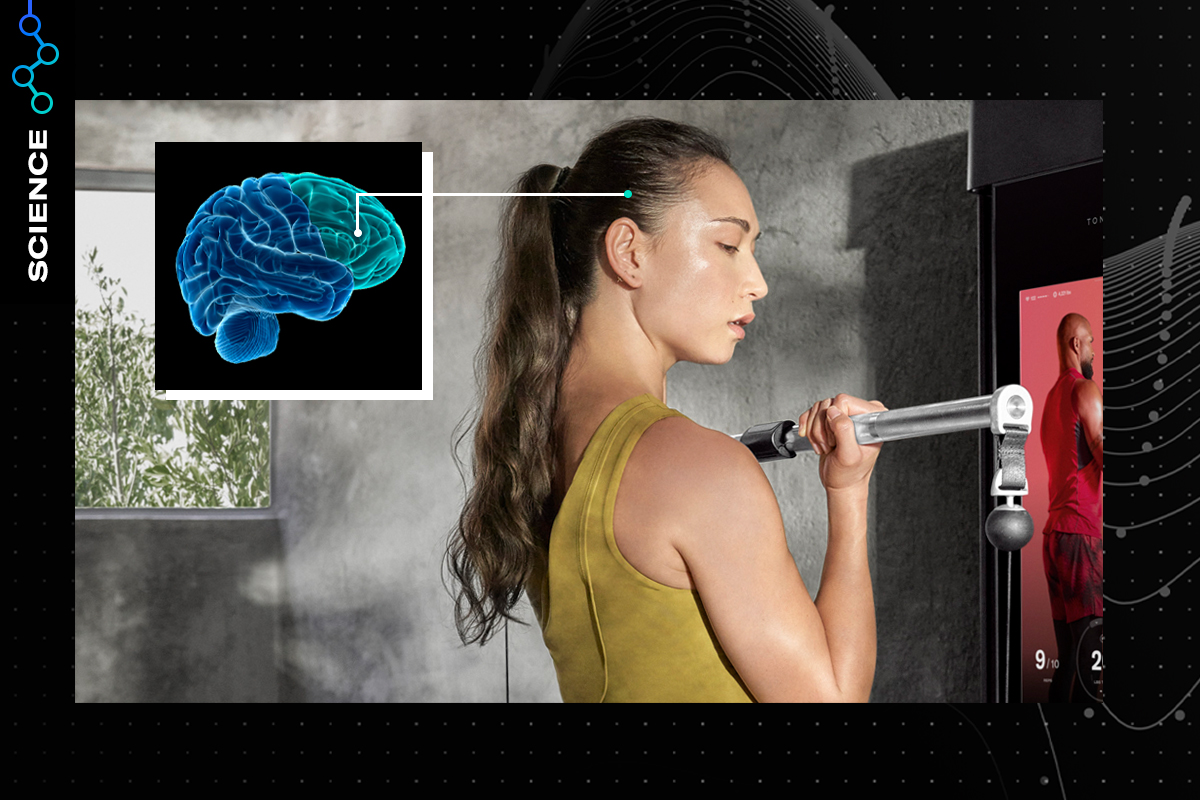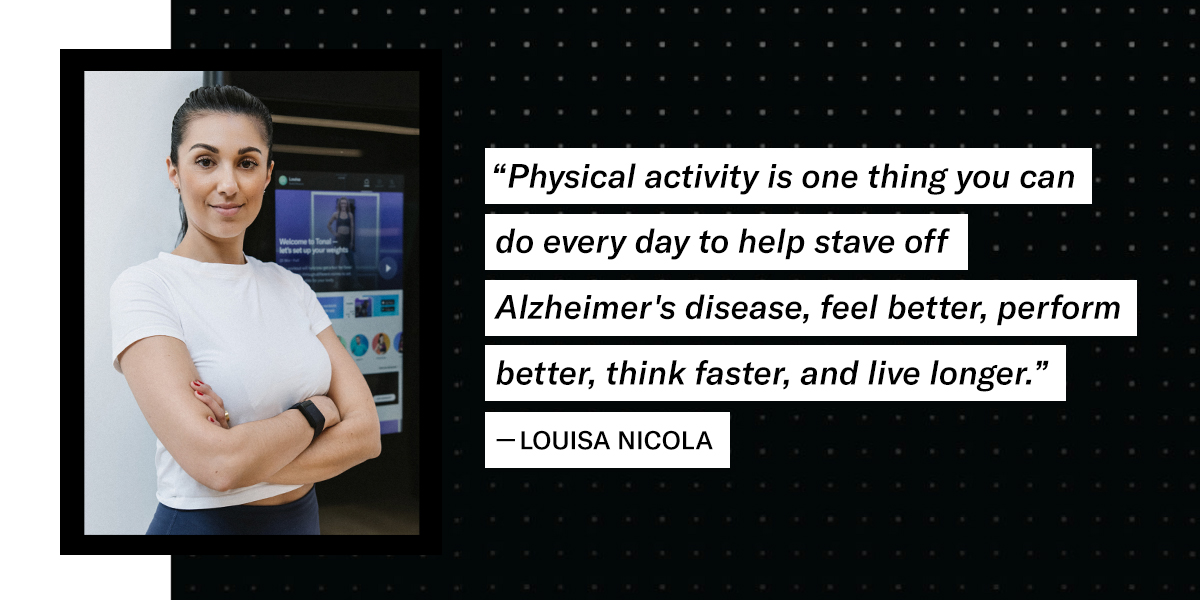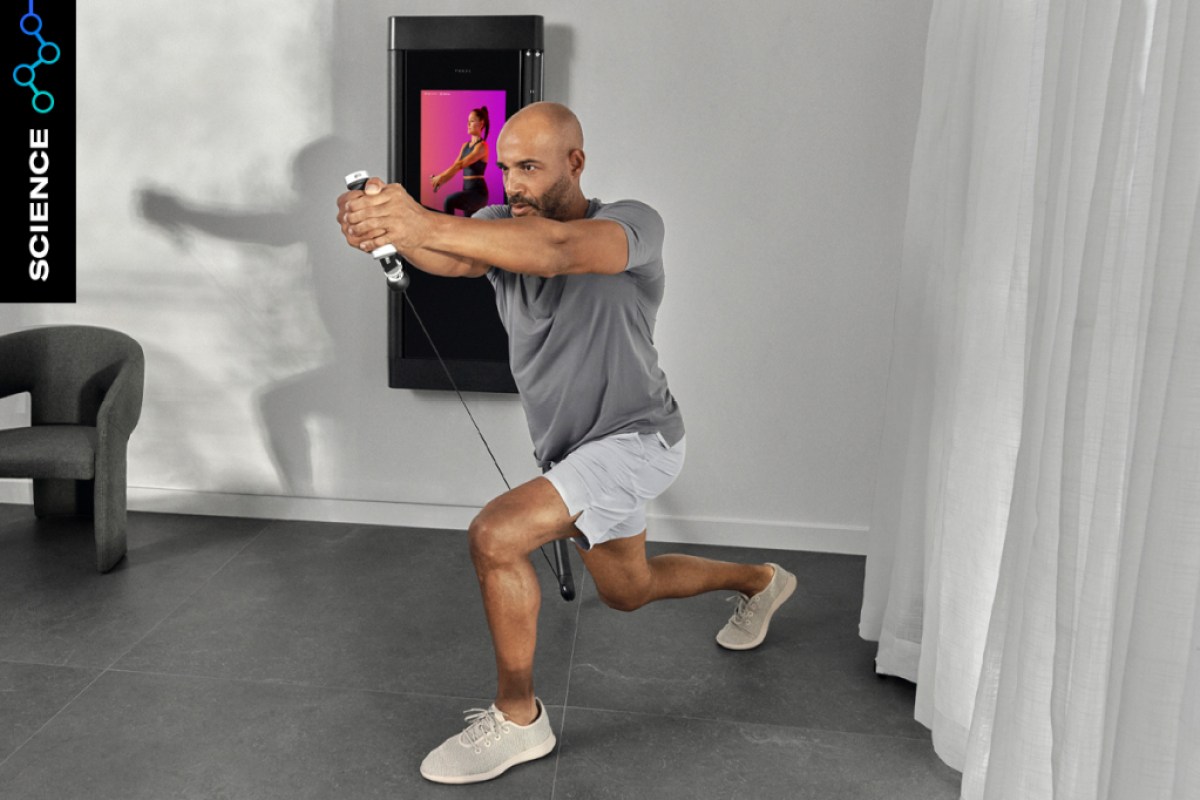Neurophysiologist Louisa Nicola describes how exercise improves your cognitive function now and long into the future.

Exercise will help you build muscle, boost your mood, and sleep better. But science shows that crushing your workouts has profound effects on your brain health, too.
“Physical activity is one thing you can do every day to help stave off Alzheimer’s disease, feel better, perform better, think faster, and live longer,” said Louisa Nicola, a neurophysiologist and Tonal Advisory Board member who spoke at the inaugural TSI Summit.
Here, Nicola unpacks three brain-health benefits that’ll have you eager to jump off the couch and into your next four-week Tonal program.
Stave Off Neurodegenerative Diseases
Neurons are the information messenger cells of the brain and nervous system. Exercise helps you maintain the neurons you have and grow new ones which helps your brain and body function better. “Eighty percent of all gray matter in the brain–responsible for every decision you make, every action you produce–can be modifiable by physical activity,” Nicola said.
There are three molecular changes in the brain that can lead to neural plasticity (your neurons’ ability to adapt to new environments) when you exercise:
- Brain-derived neurotrophic factor levels increase. BDNF is a protein that stimulates new cell growth. Nicola notes a lot of the BDNF studies published are in animals, however more research is coming out in humans.
- Insulin-like growth factor-1 is released. IGF-1 is a hormone produced by the muscle and liver. “This rapid release of IGF-1 from the skeletal muscle activates signaling pathways on receptors in the brain that improve cognitive functions.”
- Your body produces more irisin, a hormone produced by your fat cells that improves metabolic function and allows you to store and use energy more efficiently.
Looking ahead, the neural changes from your workout can reduce your risk of neurodegenerative diseases such as dementia and Alzheimer’s disease in the future. So while exercising won’t completely prevent or cure normal cognitive decline in aging or genetic predisposition to Alzheimer’s disease, working out consistently can help reduce or delay the onset of it.

Think and React Faster
Not only does physical activity increase neuroplasticity, but research also suggests that your workouts over decades can increase growth of hippocampal subregions of the hippocampus and prefrontal cortex.
“We call the prefrontal cortex the CEO of the brain, that’s where all of our executive functions like reaction time, information, processing speed, learning, and memory live,” Nicola explained. “So if we have the ability to grow this area of the brain, we can perform better, think faster, live longer, and have better cognitive functions.”
The effects of exercise can be both immediate and long-lasting. Nicola noted a study on mice in which researchers saw an immediate increase in angiogenesis, or formation of new blood vessels, to the brain after exercise. Two weeks after the training, they discovered prolonged neurogenesis. In humans, research shows exercise increases focus and memory. In other words, the workout you do today will not only prepare you for a big presentation at work, but also keep your brain buzzing for weeks after.

Feel More Motivated
Another key player in cognitive decline is motivation. If you’re not motivated to try new activities and keep learning, your neurons have no reason to grow, modify, and adapt. “We’ve all heard of dopamine as that neurotransmitter that tells us to do more, to get on that pursuit of a goal,” says Nicola. “As we age, we have dysregulation of dopamine receptors in the frontal lobe, decreasing your drive to tackle new challenges.”
It’s well-established that exercise stimulates dopamine in the brain, leading to higher motivation and reduced levels of anxiety and depression. In the same way that your workout improves your sleep and then more sleep improves your workouts, your workout also improves your motivation and thus you feel more motivated to work out.
The bottomline: Exercise, both resistance and aerobic training, improves cognitive performance in a multitude of ways. You’ll see boosts in your workout performance, your efficiency and focus in daily tasks, and reduce natural cognitive decline of aging—all due to the structural and molecular changes in the brain.


